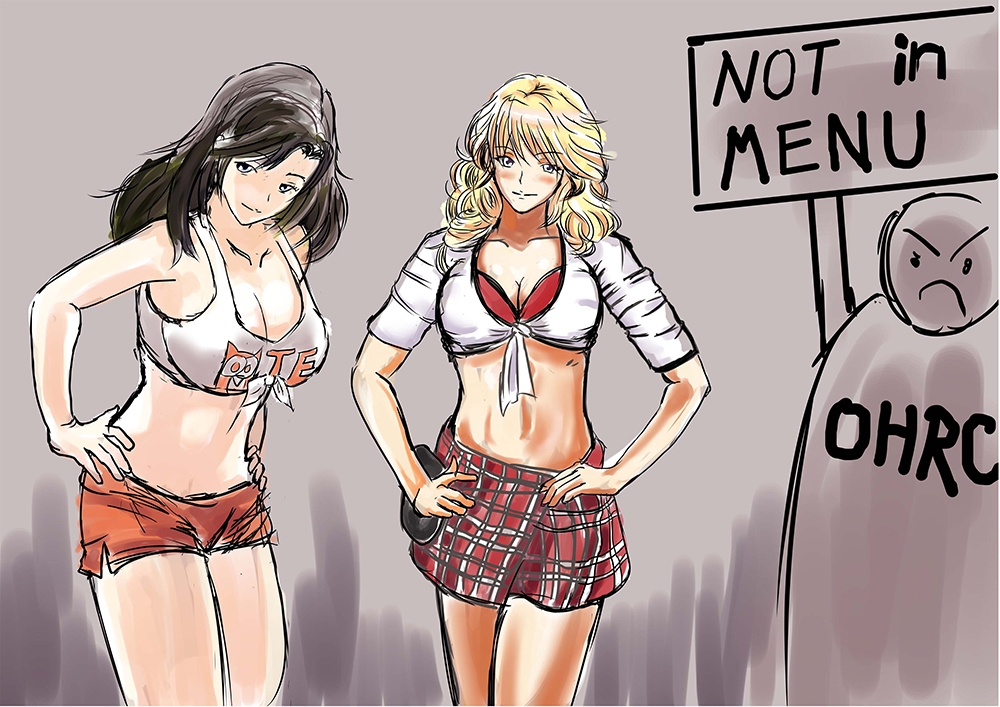Matt Dionne | Assistant News Editor
Featured illustration: The Ontario Human Rights Commission is encouraging women in the food service industry to file complaints if they feel their dress codes are oversexualized. | Cedric Wong
The days of restaurant owners oversexualizing their staff may be coming to an end following a new report by the Ontario Human Rights Commission, or OHRC.
The report, timed to coincide with International Women’s Day, was produced as a follow-up to a warning sent last year to restaurant chains that their dress codes may be in violation of the human rights code.
Last week, they reached out to the same organizations and were pleased to learn that many had agreed to adopt new policies or amend the current ones.
Renu Mandhane, chief commissioner of the report, stated that it is cracking down on chains that exploit their female staff by upholding discriminatory dress codes and unfair expectations.
“People who work in restaurants can be vulnerable to sexual harassment and discrimination because of the precarious nature of their work,” she said.
“[We encourage] companies to take the next step—putting these policies into practice on the ground and making sure that employees have the opportunity to bring forward complaints if they believe their rights have been violated,” said the OHRC in a statement.
The commission is also encouraging women in the industry to speak up and file a complaint if they feel their treatment doesn’t align with the recently implemented policy.
Nancy Rostom, a server at Shopsy’s and master’s candidate at York, says that Shopsy’s allows a flexible dress code, with the only requirement being that garments be black.
“That’s one thing I appreciate, because I’ve seen other restaurants that emphasize the idea that their servers need to look a certain way—ideally you want to look presentable, but that’s the case in any job,” she says.
Jennifer Ramsay, spokesperson for the Human Rights Legal Support Centre, said she hears countless complaints from women who are being exploited by their employers, citing specific quotes from managers, including: “honey, take off that bra” and “put on a push-up bra. Let them out!”
However, Mandhane believes many women who don’t speak out against double-standard dress codes refrain from doing so out of fear of retaliation from management in the form of termination or reduced hours.
“I’m thankful that Shopsy’s doesn’t prioritize hours for servers who are willing to dress in a way that others could consider demeaning,” says Rostom.
In some cases, dress codes can potentially incur health risks and one woman, who chose to remain anonymous, told The Toronto Star that she and several of her coworkers experience chronic neck and back pain and damage to their feet from the combination of wearing heels and carrying heavy pans and trays.
She also felt that because restaurants themselves objectify their staff, it encourages male patrons do the same.
As a result, it is claimed many make unwanted sexual comments and advances.
Rostom highlights that although men feel pressures too, it is predominantly women who feel pushed to dress in a sexualized way.
“I find that very problematic because we live in a society where many people think it’s okay to objectify women and enforcing dress codes that are highly sexualized only furthers that negative perception,” she adds.
Included in the document released by the OHRC was the list of restaurants contacted.
Several of the most well-known chains that employ scantily clad women were not mentioned, such as Hooters and the Tilted Kilt.
These particular restaurants, or “breastaurants,” have found a loophole to avoid being bound by legislation.
The “bona fide occupational requirement” means that if a business can prove that hiring attractive women and requiring them to wear revealing clothing has a direct connection to their business model, it is legally allowed.
Kathy Laird, executive director of the Human Rights Legal Support Centre, has offered support to workers who feel pressured by dress codes.
“I hope women will call us for legal help if cleavage is deemed an essential skill in their workplace,” she said.
Although the majority of restaurants will now have to adhere to the new guidelines, most well-known “breastaurants” that embody the mantra that “sex sells” will be able to continue applying sexually oriented dress codes and requirements.
Shopsy’s management was unable to comment at the time of publishing.




